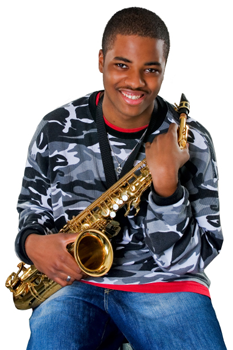Facts
The musician is constantly adjusting decisions on tempo, tone, style, rhythm, phrasing, and feeling –training the brain to become incredibly good at organizing and conducting numerous activities at once. Dedicated practice of this orchestration can have a great payoff for lifelong attentional skills, intelligence, and an ability for self-knowledge and expression.
– Ratey John J., MD. A User’s Guide to the Brain. New York: Pantheon Books, 2001
Success in societySecondary students who participated in band or orchestra reported the lowest lifetime and current use of alcohol, tobacco, and illicit drugs. (Texas Commission on Drug and Alcohol Abuse, 1998)
Scientific evidence proves that education in the arts makes better math & science students and enhances spatial intelligence in newborns. U.S. Department of Education and the College Board identifies the arts as one of the six basic academic subject areas students should study to succeed in college. The best engineers and technical designers in the Silicon Valley are nearly without exception, practicing musicians. |
Success in school |
Success in development |
|
The “No Child Left Behind Act of 2002” lists the arts as one of the core academic subjects.
A study of 237 2nd graders used piano training and newly designed math software to improve math skills. The group using the piano scored 27% higher than those using the software only. A U.S. Department of Education study of 25,000 secondary students showed that students involved in instrumental music scored significantly higher levels of math proficiency by grade 12 regardless of socio-economic status. Students involved in music performance and music appreciation scored higher in both verbal and math skills. Physician and biologist Lewis Thomas studied the undergraduate majors of medical school applicants and found that 66% of music majors were admitted… the highest percentage of any group. |
In a study conducted by Dr. Timo Krings, pianists and non-musicians of the same age and sex were required to perform complex sequences of finger movements. their brains were scanned using a technique called “functional magnetic resource imaging” (fMRI) which detects the activity levels of brain cells. The non-musicians were able to make the movements as correctly as the pianists, but less activity was detected in the pianists’ brains. Thus, compared to non-musicians, the brains of pianists are more efficient at making skilled movements. These findings show that musical training can enhance brain function.
A research team exploring the link between music and intelligence reported that music training is far superior to computer instruction in dramatically enhancing children’s abstract reasoning skills, the skills necessary for learning math and science. A University of California (Irvine) study showed that after eight months of keyboard lessons, preschoolers showed a 46% boost in their spatial reasoning IQ. In the Kindergarten classes of the school district of Kettle Moraine, Wisconsin, children who were given music instruction scored 48 percent higher on spatial-temporal skill tests than those who did not receive music training. |
Success in life
|
|



